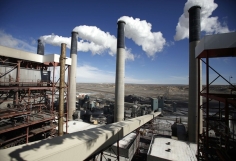The Church Commissioners have won widespread support for a move to put pressure on energy giant ExxonMobil to disclose the impact of climate change policy on its business.
The Church Commissioners manage a fund of around £6.7 billion, whose revenues are used to support the Church of England. The Commissioners co-filed a shareholder motion with the New York State Comptroller Thomas DiNapoli. It asks Exxon to disclose the effect on its business if measures to restrict global warming to two degrees are successful.
More than 30 institutional investors have so far said they will vote for the motion.
Exxon's competitors Shell and BP have already agreed to disclose how much they will be impacted by efforts to lower greenhouse gas emissions. They were targeted by similar shareholder proposals co-filed in 2015 by the Church Commissioners and other investors. Exxon had attempted to have the resolution struck down by the Securities and Exchange Commission but its request was denied last month.
Church Commissioners spokesman Edward Mason said: "We are delighted with the scale of support this resolution has received so far. The resolution is part of a much wider trend following the Paris Agreement for investors to ask companies to improve disclosure on how they are positioned for the risks and opportunities posed by climate change."
Exxon has funded groups spreading information denying human-induced climate change and lobbying politicians against climate change legislation. While it pledged to cease doing so in 2007, a Guardian report last July claimed it was continuing the practice.
It has a long history of rejecting shareholder motions on climate change and of rejecting the scientific consensus.
When Exxon challenged the most recent shareholder motion, DiNapoli said: "ExxonMobil risks becoming an outlier among its peers who have publicly supported reining in climate change.
"As investors, we need to know how ExxonMobil's bottom line will be impacted by the global effort to reduce emissions and what the company plans to do about it."
Exxon is also under under pressure from a coalition of 17 US attorneys general, Attorneys General United for Clean Power (AGUCP), who have banded together to enforce climate change laws. New York attorney general Eric Schneiderman announced at a press conference on March 29 that the coalition was working to find "creative ways to enforce laws being flouted by the fossil fuel industry and their allies in their shortsighted efforts to put profits above the interests of the American people and the integrity of our financial markets".
Schneiderman referred to a "relentless assault from well-funded, highly aggressive and morally vacant forces that are trying to block every step by the federal government to take meaningful action" to fight climate change.
The initiative by the attorneys general was criticised by some religious conservatives, however.
Jeffrey Riley, professor of ethics at New Orleans Baptist Theological Seminary, told Baptist Press: "Few deny that the climate is changing – it always has. The debate is on the cause. In spite of the public rhetoric that declares scientific consensus, the debate is still out. Public and political rhetoric on this issue is neither truth nor an argument for truth. Christians who hold that we are stewards of the earth ought to be interested in truth, and for that reason should not support any action that stifles legitimate scientific and economic debate."















